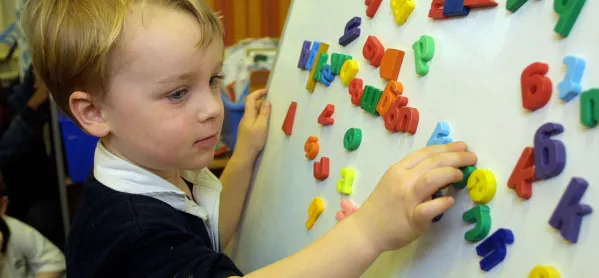Proposed changes to the goals that young children are expected to reach by the end of Reception year will narrow the curriculum, an early years expert has warned.
Michael Freeston, director of quality improvement at Early Years Alliance, told a conference in London that he feared that the Department for Education's proposed changes to the early learning goals, along with Ofsted's planned inspection checks on synthetic phonics teaching, and the introduction of a baseline assessment – could collectively “narrow the curriculum to focus on technical, functional elements of provision”.
Need to know: Proposed new early learning goals
Ofsted: Early years anger over Bold Beginnings report
Quick read: Plans to broaden baseline beyond maths and literacy dropped
Children aged 4 and 5 are assessed by teachers against 17 early learning goals at the end of the Reception year. This assessment is known as the Early Years Foundation Stage Profile (EYFSP).
Early years changes
As part of the proposed changes to the EYFSP, there are new draft early learning goals, which are currently being piloted in 25 schools. These no longer include an assessment of shape, space and measure in maths, something that has already raised concerns.
The EYFSP also includes comments from teachers on how children demonstrate three “characteristics of effective learning” which are: playing and exploring, active learning, and creating and thinking critically.
But Mr Freeston told delegates at a Westminster Education Forum meeting today that he thought these characteristics of effective learning had been “downgraded” in the piloted version of the EYFSP.
He added: “Books are referenced endlessly [in the pilot EYFSP]. If this was changed to stories it becomes far less concerning.
"That and the fact we’re focusing on number – shape, space and measure has been removed from the early learning goals.
"That drive towards learning through books and that numbers are what mathematics is about - you don’t have to be much of a conspiracy theorist to take the view that we’re looking at a more formalised approach to what is going on, it makes the early years foundation stage look more like key stage 1.”
The government has said that it is revising the early learning goals to support children’s early development in language and vocabulary and to reduce teachers’ workload.
The new draft goals were published in June 2018. They cover listening, speaking, gross motor skills, fine motor skills, self-regulation, managing self, building relationships, comprehension, word reading, writing, number, numerical patterns, understanding the world – past and present, people, culture and communities, the natural world, creating with materials and performing.
The pilot results are due to be evaluated by the Education Endowment Foundation and Action for Children and proposals will be refined ahead of a full public consultation.
A Department for Education spokesperson said: “We want all children to arrive at school confident and ready to learn. This is why we are driving a greater focus on language, vocabulary and numerical development in the early years, which is key to tackling the gap between disadvantaged children and their peers.
“Our Early Years Foundation Stage Profile reforms have been developed with feedback from the sector that suggested the need for clearer and more specific goals to help teachers make more accurate assessments of each child’s development and give children the broad range of knowledge and skills for good future progress through school and life.”




